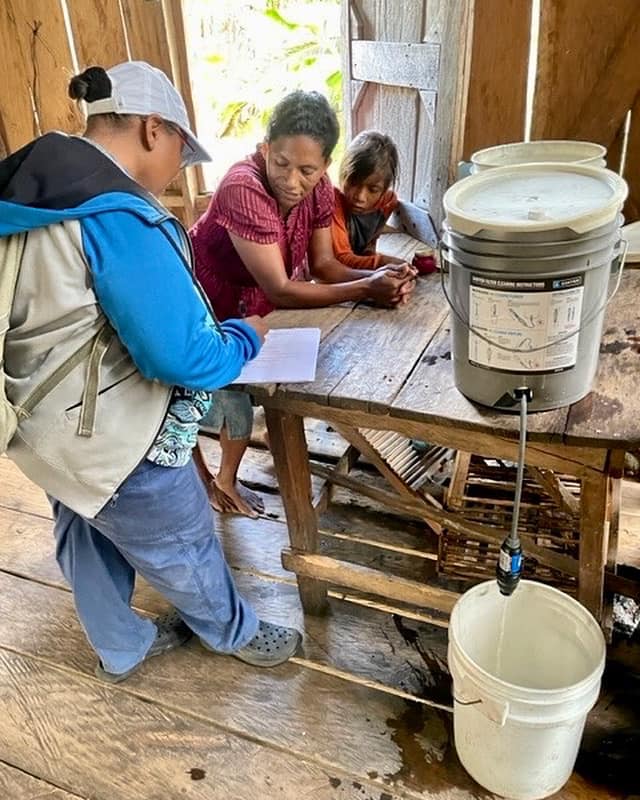(A Water Filter, purchased through the “Blessings Flow” Project, in use in a home in Honduras)
Words are Nice – Action is Better
By Bishop Chris Giesler
Preaching Text: Mark 1:21-28
Jesus has set up his new headquarters in the village of Capernaum on the shores of the Sea of Galilee. As we pick up the story in our Gospel reading, it is the Sabbath. And if it is the Sabbath, you know where Jesus will be found – at the Synagogue. And there, the people are amazed at the authority with which this new guy in town teaches. He is not like some of those other Rabbis because Jesus speaks with a sense of intimacy with God and an urgency to have others hear his message.
Just as Jesus is in the middle of this wonderful teaching, there is an interruption. A man with what Mark says is an unclean spirit who cries out: ‘What have you to do with us, Jesus of Nazareth? Have you come to destroy us? I know who you are, the Holy One of God.’ And rather than avoid the situation or have the man removed, Jesus instead moves closer and, with a voice of conviction, commands the unclean spirit to come out. With great convolutions, the unclean spirit comes out of the man, and the man is healed. Wow, they all say: ‘What is this? A new teaching—with authority!
Occasionally, we see demon possessions dramatized in movies like “The Exorcist” or houses haunted by evil spirits. Still, it is not something that we deal with on a daily basis. In Jesus’ day, however, because of their lack of understanding of mental illnesses or the biology of the human body, everything was seen as a battleground between good and evil, and this man’s behavior was seen as just that. Regardless of what was causing this man’s erratic behavior, Jesus’ response is what is more important here: a clear sense of compassion for the man who was struck with this illness and Jesus’ ability to heal it. His authority was not only in his words but, more importantly, in his actions.
Let’s focus our attention on what Mark calls the unclean spirit. To have anything labeled as unclean meant that it was something that people avoided at all costs for risk that they, too, would be labeled as unclean and, therefore, unholy. People who had bleeding diseases were unclean; lepers were permanently unclean and removed from society so that they would not make anything else unclean. In the parable of the Good Samaritan, it was the Samaritan, unencumbered by religious formality, who moved with compassion and care for the man who was beaten, bleeding, and left for dead. The religious authorities, however, stepped around the man for fear of becoming unclean.
Furthermore, it was often thought that many of these illnesses were brought upon you as punishment from God for something that you had done wrong, a sin. So not only was a person sick and unclean, but they deserved what they got. This made them even more untouchable.
So, for Mark, here the battle lines are drawn. This is Jesus versus the demonic, clean versus unclean, good versus evil, and what belongs versus what needs to be cut away. Here, we see that things work differently in the kingdom of God that Jesus is pronouncing. So Jesus moves closer to the man in need, engages him in his torment, and then sets him free.
So today, if we leave this story to be about a man with a demon and Jesus taking care of him, then we have missed the story’s power and the opportunity to grow in faith and in action.
This man’s torment was separating him from God and the community around him, and with compassion, Jesus removed the barrier. Let’s be honest here: each one of us has a part of us that keeps us from being the child of God that we truly can be. And for most of us, because it is so prevalent in our society, it is the “ME FIRST” demon. The fact that everything can be judged by how it affects me. If it is of no benefit to me, then it is meaningless. If it does not make me richer, then it is no good. If it does not help me have fun, then why bother? If it does not meet my needs, then forget it.
In the Kingdom of God, this is to be different; after all, we have been given the example of Jesus; how do we follow him? It is not about me; it is about us and the will of God in our lives.
What are the demons that we are facing today? What are the things keeping us from being the children of God that we are created to be? Broken relationships, financial stress, poverty, hunger, unequal access to quality education? These are active and present in our society today. What can we do to help remove these barriers for the people in our neighborhoods? Words are nice, but active work by followers of Jesus is even better.
Father Richard Rohr has written:
When Christians say “Come, Lord Jesus” (Revelation 22:20) or “Jesus is Lord” (1 Corinthians 12:3), we are actually announcing our commitment to Jesus’ upside-down world where “the last are first and the first are last” (Matthew 20:16) over any other power system or frame of reference. If Jesus is Lord, then Caesar is not! If Jesus is Lord, then the economy and stock market are not! If Jesus is Lord, then my house, possessions, country, and job are not! If Jesus is Lord, then I am not!
The price for real transformation is high. It means that we have to change our loyalties from power, success, money, ego, and control to the imitation of a Vulnerable God where servanthood, surrender, and simplicity reign. (The Realm of God — Center for Action and Contemplation. https://cac.org/daily-meditations/the-realm-of-god-2018-01-26/)







